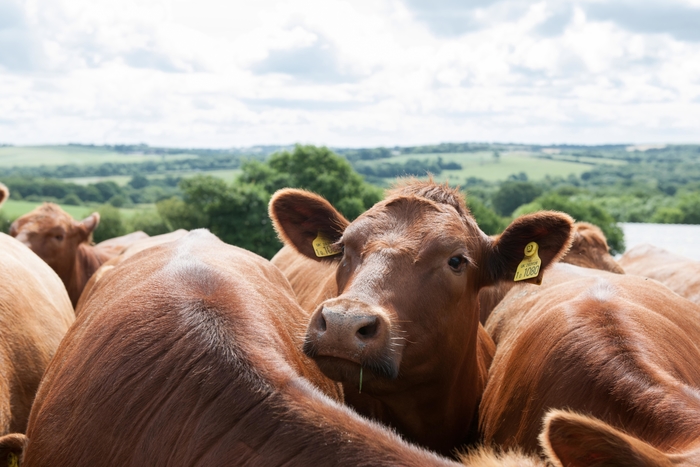Livestock farming is often dismissed as irredeemably inefficient and polluting. But that was before anyone thought of considering a cattle herd as a diverse group of animals
Implications of livestock farming on climate change should not be drawn from aggregate statistics, reveals a study based on a new method of carbon footprinting for pasture-based cattle production systems that can assess the impacts of individual animals.
The new method, developed by a team from Rothamsted Research and the University of Bristol, records the environmental impact of each animal separately before calculating the overall burden of a farm.
Existing methods of carbon footprinting are primarily designed to quantify total greenhouse gas (GHG) emissions of a particular farm, and are therefore unable to provide information on environmental performances of specific animals.
The ability to identify “green” cattle within a herd – cattle that produce lower emissions per kilogram of liveweight gain – promises more sustainable farming, they report in the study published today in the Journal of Cleaner Production.
The team applied both the new and old methods to field data collected at the North Wyke Farm Platform (NWFP), a Rothamsted state-of-the-art facility that supports three experimental farms over 63 hectares in Devon.
They demonstrated that the latter approach consistently underestimates levels of GHG emissions because it fails to consider sufficiently the impacts of poorly performing animals, which are known to produce disproportionally large amounts of methane through enteric fermentation.
“The research offers two important lessons that may seem paradoxical at first sight,” says Taro Takahashi, Research Scientist at North Wyke and senior lecturer in Sustainable Livestock Systems and Food Security at Bristol Veterinary School, who led the research.
“Short-term, many carbon footprint estimates currently available are probably too low, which is clearly bad news for the industry. But long-term, this also means that mitigation of greenhouse gas emissions originating from ruminants could be easier than traditionally thought—if we are able to select the right animals through the right screening methods. And this is precisely what we are trying to achieve at North Wyke.”
The work also marked the first comprehensive evaluation of the three production systems at North Wyke. “This study demonstrates the true value of primary data being collected by the NWFP team every day,” says Paul Harris, the facility’s project leader. “They can challenge our intuition and enhance our understanding of how we can make agriculture more sustainable.”
The new study comes as the debate about the role of livestock in sustainable global food production intensifies. In a report published this month, the Food Climate Research Network (FCRN) reiterated that livestock production is a net contributor to global warming regardless of the species and the rearing method.
“We agree with the FCRN report that ruminants cannot reverse climate change, even if they are grass-fed,” says Michael Lee, head of North Wyke and professor of Sustainable Livestock Systems at Bristol Veterinary School. “However, as we discussed in our 2014 article in Nature, pasture-based livestock production systems have a multifaceted role in society – the point acknowledged, but not actively addressed, by the FCRN report.
“At Rothamsted, not only do we aim to advance knowledge on how to minimise negative impacts of agricultural production, as exemplified by the current paper, but also on how to optimise the positive contribution grazing livestock can bring to us as part of a well-designed food supply chain.”
Lee adds: “Such aspects include effective use of land unsuitable for growing crops, production of higher quality protein and more bioavailable micronutrients, improved animal welfare, prosperous rural communities and flood prevention. They all make up the bigger picture when looking for a sustainable future of food production.”
NWFP is a UK National Capability funded by the Biotechnology and Biological Sciences Research Council (BBSRC). Its datasets and resources are open to all researchers, including those outside Rothamsted. The research was funded by the Agriculture and Horticulture Development Board (AHDB) and by the Department for Environment, Food and Rural Affairs (Defra) through the Sustainable Intensification Research Platform (SIP).


